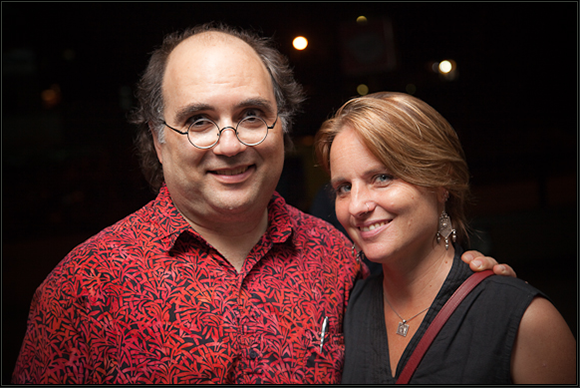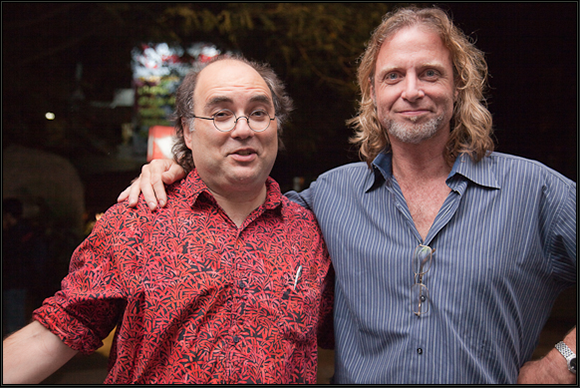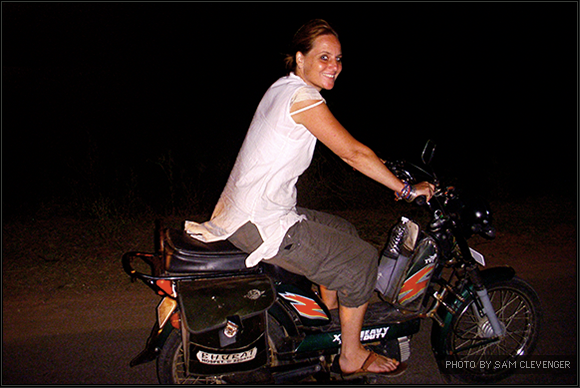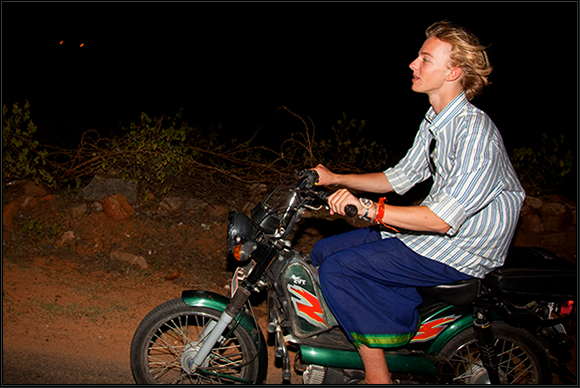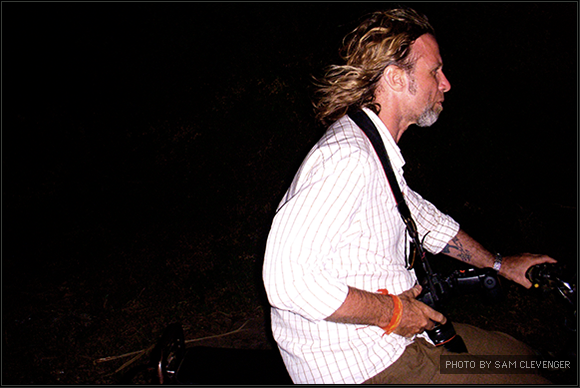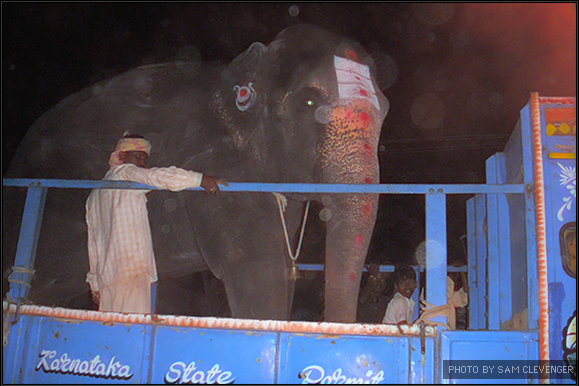.
[audio:Glen Campbell – Dreams Of The Everyday Housewife.mp3|titles=Glen Campbell: Dreams Of The Everyday Housewife]
.

.
I came to India to write. Somehow, over these past six months, I seem to have instead exchanged vows with a house. I’ve gone from being an adventurous citizen of the world, boldly throwing myself into the unfamiliar Indian landscape, to being an everyday Indian housewife. This, I imagine, is a lot like being an everyday American housewife… circa 1959… but without the cocktails or the dependable appliances.
In Bangalore, as you know by now, we live in a big house. A big house that looks like it was built for a Columbian drug lord. A house that we now know costs ten times what a house in Bangalore ought to cost, and probably twice as much as an actual big drug lord house.
We’d be willing to accept our financial folly and suck up the high rent, as it is still lower than we’re used to in the Bay Area, if it weren’t for the fact that the drug lord house was apparently built by crack heads.
The house is beautiful, to be sure. Stunning modern architecture, and more of a compound than a residence – a place you don’t need to leave to get air or light. On the ground floor there’s a built-in swimming pool where I swim laps every day, a climbing wall, and a treadmill that we never use. There are two living rooms, a media room, and four bedrooms, each with their own bath, a giant kitchen and a dining room. The place spans five levels – plus a rooftop where I watch eagles swoop overhead while I hang my laundry. One side of the house is open from the swimming pool to the roof. A bridge walkway connects the center bedroom to the marble hallway. When a breeze blows outside you feel it ripple through the house.
The place is well appointed with shiny modern appliances and fixtures, but the behavior of these things is unpredictable: when you turn a faucet, the handle is just as likely to come off in your hand, as it is to produce water. The pool’s pump leaks, creating a permanent mosquito pond in the basement; the toilet in the guest room stands in a lake on the stone floor; the media room with the giant projection screen reeks of mildew; the kitchen sink drips something that looks like blood; and the air conditioner in the master bedroom sometimes pours water on your head.
In India, the renter is expected to pay for the repairs on their landlord’s house.
All of this internal household chaos is set to the external soundtrack of a symphony of cement mixers and crying babies at the job-site ten feet below our window. The same architecture that lets in air and light now also lets in dust and noise – copious amounts of both.
Still, these annoyances are minor compared to the facts that:
A) Giant rats run wild in the house after midnight
and
B) Our refrigerator hasn’t worked for more than a month now.

The rats have chewed holes through the window screens to get into the house, and I can hardly blame them: Rathnama tosses food scraps in the floor as she’s cooking; onion peels, butter wrappers, rejected green beans and hot chilies. In the beginning, she swept up after every meal, but these days we’re lucky if she kicks the big pieces to the corner by the overflowing trashcans. No matter how many times, or how loudly, I explain to her that she has turned the kitchen into a nightclub for rats, she just doesn’t get it.
Still, after every conversation, I walk away convinced that I’ve made my point clear. Mostly because I as I talk, she nods her head and smiles and says, “Yes, yes, yes, rats, chchchchch,” in something that sounds like English. But every time I am fooled.
 Last week I set out rat traps, and caught two big juicy brown rats the first night. When I came downstairs in the morning Rathnama, apparently unclear on the end goal, was sitting on the floor next to the trap feeding the rat pieces of chapatti through the bars.
Last week I set out rat traps, and caught two big juicy brown rats the first night. When I came downstairs in the morning Rathnama, apparently unclear on the end goal, was sitting on the floor next to the trap feeding the rat pieces of chapatti through the bars.
I finally decided to call a real pest control service. The next day they came and set out massive, messy, glue traps, with poison cake as bait.
Phil and I went on a long motorcycle ride for the weekend, and returned late on Sunday to find a white plastic bag on the floor in the hallway.
The bag was moving.
“Rats!” Rathnama said, proudly, and held up nine fingers.
“Get them out of here!” I screeched. “Out, out! Rats, bad!”
Rathnama picked up the bag, giggling, and launched it over the fence, to the construction site next door.

The refrigerator is still not working.
The latest “repair people” promised to come this weekend; this has been going on for more than 4 weeks now. I waited five days for their initial visit, which yielded three small brown men looking at the black monolith like they were auditioning for 2001. Or maybe Zoolander.
After some serious gastronomic frustration during our first month here, we asked Rathnama to cook for us, in addition to her extant cleaning duties. Initially we had loved her food, but over time she has stalled out at a rotation of three meals. Lemon rice, cauliflower with caramelized cashews and chapatti, dosa and chutney. And now, after six months we are SICK OF INDIAN FOOD.
When I cook, which is more and more often, the menu is limited by the availability of ingredients, the lack of an oven, and the fact that cooking bores me. I make college student dinners; Top Ramen glammed up with vegetables; spaghetti, sans parmesan, olives, sausage, etc.; when I run across chicken that doesn’t look too scary I make fried chicken, mashed potatoes, and carrots. With quite a lot of effort, I can fake Mexican food, though we have to blanch the salsa so it won’t make us sick.

On Monday morning the repairmen show up at the door. By the time I come downstairs in my bathrobe there are three men in the dining room, plus Moustaq, our driver. The fridge men leer at me, practically drooling. Moustaq steps between them and me, in a protective gesture. He hands me a bill.
“Is it working?” I say as I scan the handwritten invoice.
“No, Medam. This is charges for last time visiting.”
In India, finding a new American family is like catching a Leprechaun. There is a three- or four-month window when we still think in dollars and translate to rupees and every purchase feels like you are kicking ass at a Monopoly game. Money falls out of your pockets as you walk down the street, you don’t care because the denominations are so insignificant. It doesn’t even seem odd that there are three different 2 rupee coins. This is all tremendously beneficial to the lucky locals who stumble upon the leprechaun. But after a while, you just can’t help but catch on.
I laugh. “I’ll pay when the fridge works.”
The man, who is in fact dressed like an actual repairman, is talking to Moustaq.
“Medam,” Moustaq translates, “He come today after four. If he cannot arrive after four today he will arrive the next day after or before at eleven itself.”
Moustaq’s English is much better than most, but he tends to get some of the basics mixed up – “before” and “after,” “inside” and “outside,” “come,” “go.”
“Why can’t he fix it now?” I ask.
A question of that complexity, in my foreign English, threatens to make most Indians’ heads explode, so I simplify.
“Fix now,” I say.
“No, ma’am, is not possible. Bad smell,” Repairman says.
“You’re not going to do the repair because the fridge smells bad?”
“Yes, ma’am.”
“It smells bad because it has taken a month for you to fix it,” I explain.
“Just leave the door open one day, I come back.”
“Are you fucking joking? I’ve been waiting for you to come back for the past eight days.”
“Tomorrow, ma’am.”
“Do you have the needful part with you?”
“Yes ma’am.”
“So it is possible for you to fix today?” I’ve learned to always ask what I would have previously thought of as ‘stupid questions’. I assume nothing.
“Just one day, ma’am. Open door one day, I come back.”

Rathnama is already cleaning the fridge, though with a dirty rag and cold water. There is no hot water in the kitchen. I hand her a bottle of something blue, because it reminds me of Windex, and mime spraying the inside of the fridge and then scrubbing.
I’ve been trying in vain to get her to do this for the past month. Each time I illustrate my request, she takes out another jar of something, rinses it off, and leaves it on the counter. Last week I pulled everything out of the fridge, left the door open, and had one last go at charades before giving up completely.

“After one week, ma’am, worms arrive,” Repairman continues.
“Yes,” I growl. “We know.”
“We are cleaning it right now,” I say. “It’ll be done in two minutes.”
I can’t believe I just said that. I hear that phrase, “Just two minutes, just two minutes ma’am,” several times every day. Ordering lunch, at the pharmacy, the tailor, everywhere.
And it is never, ever, two minutes.
“Tomorrow ma’am, I come back.”
“NO.” I say a little too loudly and a little too quickly.
There is no way I’m letting this man out of my house before he has repaired the refrigerator. I am prepared to duct tape him to a dining room chair if that’s what it takes.
“I’ve put up with rotting food for a month, waiting for you to fix this damn thing,“ I say, “You can put up with a bad smell for a few minutes.”
Finally, he wobbles his head in agreement, and sets his tool bag on the floor.
“Okay, okay.”
As if on cue, the electricity goes out.
He picks up his tool bag:
“Tomorrow, ma’am.”

Sometimes you surrender, sometimes you just give up. I’m not sure which I’ve just done. They say when you surrender, you open yourself up to the next layer of India, the good one, the magical one, the layer that contains trace elements of enlightenment.
“Bring it on,” I say.
“Just two minutes, ma’am,” India replies.
